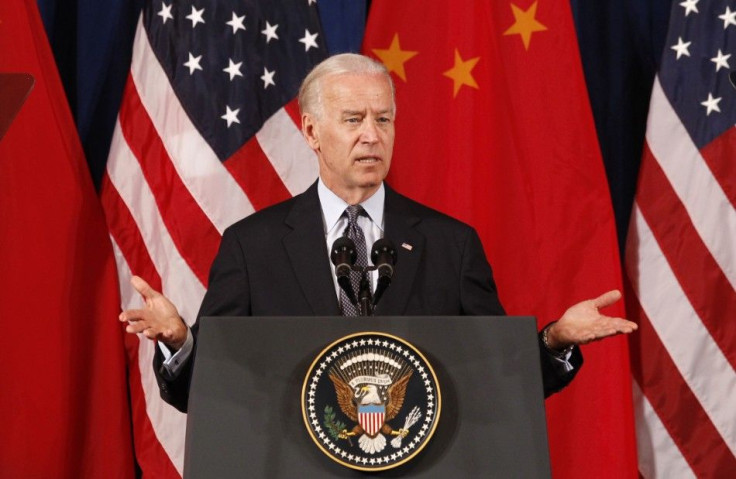Joe Biden China Visit: 5 Things the Vice President Must Discuss
Analysis: A List of Joe Biden's China Talking Points

As U.S. Vice President Joseph Biden finishes his first night in China, he goes to sleep with a packed agenda and a full plate of political topics to discuss over the next five days.
During the state visit, Biden will meet with his Chinese counterpart Xi Jinping, as well as President Hu Jintao, Premier Wen Jiabao and a number of other officials. He will also take a tour of the Sichuan Province with his daughter, who came along on the trip.
Here are five things that Biden must talk about with Chinese leaders.
1. Chinese Vice President Xi Jinping: Xi is expected to take over when President Hu leaves office, and building a positive relationship with the politician now is essential to the future of Sino-U.S. relations.
"One of the primary purposes of the trip is to get to know China's future leadership, to build a relationship with Vice President Xi, and to discuss with him and other Chinese leaders the full breadth of issues in the U.S.-China relationship," Tony Blinken, National Security Adviser to the Vice President told CNN. "Simply put, we're investing in the future of the U.S.-China relationship."
2. South China Sea: International tension crescendoed this summer between China and Vietnam, when both countries claimed rights over the disputed body of water. Shots were fired, and in July, Secretary of State Hillary Clinton said that the dispute could severely damage economic growth and political stability in the Asia-Pacific region.
"The rest of the world needs to weigh in because all of us have a stake in ensuring that these disputes don't get out of control,'' Clinton told reporters in Bali in July.
3. Taiwan: There has been bad blood between communist China and democratic Taiwan for years, to put it mildly. While the U.S. has tried to remain diplomatic in its relations with the two nations, a potential arms deal with Taiwan has China on the defense.
On Aug. 1, 181 members of congress petitioned President Barack Obama to sell F-16 fighter jets to Taiwan, which "would support thousands of American jobs -- especially well-paying jobs in the manufacturing sector."
The White House has said that Biden won't discuss the issue, but according to China Daily, "it would be naive to believe this. The issue will be raised."
4. Military Development: U.S. officials say they are concerned with the rapid growth of the Chinese military, according to Reuters. China has increased its defense budget, yet there is very little transparency regarding how China is spending its money. This growth is making some in the U.S. nervous. Biden, who isn't one for subtlety, should do his best to assure that military relations between the two countries are collaborative and clear. With the ever-present threat of nuclear missile development in North Korea, Biden also needs to make-nice with Pyongyang 's main ally.
5. Debt: This is the biggest, most significant thing the Vice President will discuss, and it would be naive to think that Chinese officials won't stress the issue. The debt crisis is taking up significant space in Chinese newspapers, and Biden will need to ease the country's worries over the downgrading of the U.S.'s credit rating. China holds $1.16 trillion in U.S. debt, and the government wants to be assured that their holdings are secure.
"The Obama administration is deeply committed to maintaining the fundamentals of the U.S. economy that ensure the safety, liquidity, and value of U.S. Treasury obligations for all of its investors," Biden told one Chinese magazine in advance of his trip.
"This is first and foremost a firm commitment to U.S. citizens, who hold the large majority of all outstanding Treasury obligations and, also, to our foreign investors, including China."
© Copyright IBTimes 2024. All rights reserved.





















